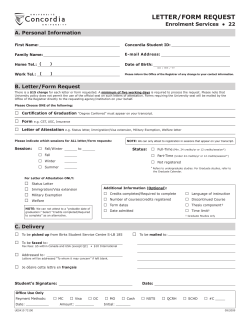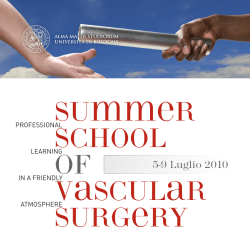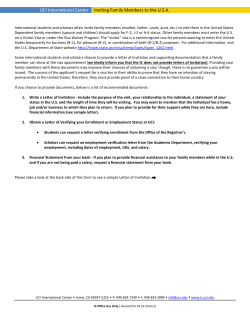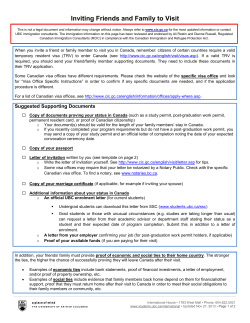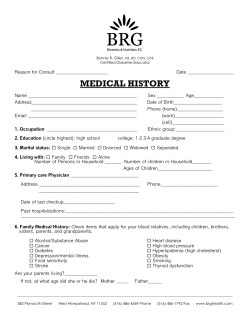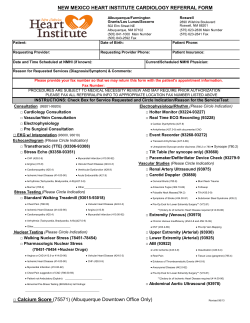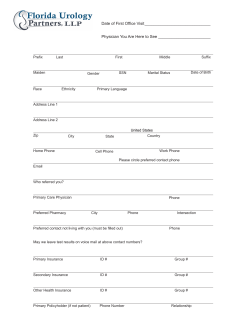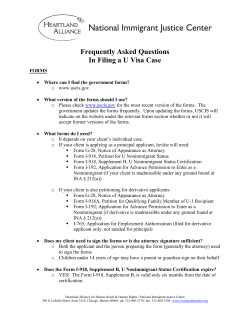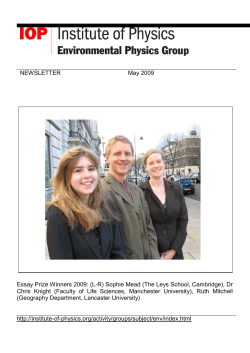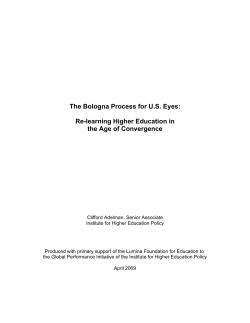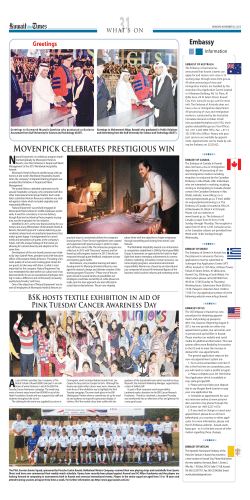
SAIS Europe 2014-15 Incoming Student Guide
WELCOME LETTER FIRST STEPS Visa Health Insurance Arrival Housing Hotels in Bologna FINANCES Tuition and Living Expenses How to pay tuition Pre-term Course Fees Employment Opportunities Additional Expenses OTHER INFORMATION How to get to SAIS Europe What to pack Computers and other electronics Books The information in this booklet may be subject to change 1 WELCOME LETTER Back to top Dear Incoming Student, Congratulations on your admission to SAIS Europe! We look forward to welcoming you to Bologna and to what will probably turn out to be one of the best years of your life, if the opinions of our alumni are any indication. You will find that Bologna is a beautiful medieval city full of arcades (40 kilometers of them) and earth colors, marble sidewalks and welcoming cafés. Bologna is home to the University of Bologna, one of the oldest universities in the world, and the second largest university in Italy with about 100,000 students enrolled. In addition, the Erasmus program brings students from all over Europe to Bologna. There are also several other, mostly undergraduate, U.S. programs here, so Bologna is definitely a young city with plenty of activities that you may find interesting and which will be exciting to explore. By and large you will find the bolognesi welcoming, friendly and proud of their city and its history. Bologna is the main town in the region of Emilia Romagna. It has Etruscan, Celtic and Roman roots, and the town center is very well preserved, with traces of all stages of its history still visible. The tourist office has leaflets that will help you discover different parts of bolognese life. Today Bologna has a thriving industrial sector, notably in machine tools and also in the food and packaging industry. Unemployment is relatively low in comparison with the national average. There is a wide range of shopping possibilities, from the deluxe designer stores to the weekly market that offers a wealth of bargains. You can walk across the city in about half an hour or invest in a bike and scoot about like most of the locals. Public transportation (mainly buses) is frequent and reliable. Bologna is also the center of a rail hub, making all regions of Italy easily accessible by train from the central station. The airport offers many connections to Italian and European cities. Look into the economy airlines that operate out of Bologna and smaller nearby airports; a weekend away in a European capital may be within your reach. Bologna is not immune to the problems faced by all major cities. Micro-criminality is present and requires that you be vigilant, especially when walking around late at night. 2 WELCOME LETTER Back to top But crime here is certainly no worse than in other European cities and rarely involves the use of weapons. Bologna has prominent soccer and basketball teams and many other spectator sports are also practiced locally. Excellent skiing facilities are available only a few hours away by train or car. If you are interested in playing a sport, you have a vast array of options at your disposal through local associations and clubs. The town itself has many parks, and the nearby hills offer good hiking opportunities, some of which can be quite challenging. Perhaps the most fascinating aspect of your stay in Italy will be living in and experiencing a new culture. Social traditions and behavior will differ. Get used to eating your dinner late in the evening if you share it with Italians. Remember to greet people you know or deal with on a daily basis with a bright buongiorno or buonasera before starting any small talk. And if you want to pass as a native, never order a cappuccino after 10 am! Remember to make an effort to learn enough Italian so that you are able to interact within the exciting community that will become your home. If you need advice about services, emergencies, referrals etc., the Student Affairs office will help you. Take time to read through this booklet and become familiar with its content. The information was updated in March 2014, but some changes may occur during the summer. When you get here you will also receive a copy of the Guide to Living in Bologna. Its useful information has been compiled with input from past students, faculty and staff. You will also find both booklets online. The Student Handbook, which addresses academic procedures and requirements, will also be available upon arrival and online. We look forward to welcoming you to Bologna! The Bologna Center Staff and Faculty, March 2014 3 VISA & HEALTH INSURANCE Back to top Getting a Visa EU citizens do not need a visa to stay in Italy. Non-EU citizens must have a student visa (visto per motivi di studio) in order to obtain a temporary residence permit (permesso di soggiorno) in Bologna. All students (EU and non) are required to have health insurance that is acceptable to the Italian authorities (see details below). If you currently have a valid visa to another Schengen country you may find getting a new visa difficult. Please contact [email protected] if you have trouble obtaining your visa. SAIS-Washington Italian Visa Service U.S. citizens and students currently residing in the U.S. are strongly advised to take advantage of the visa service offered through SAIS in Washington. The Office of Admissions at SAIS Washington will accept visa applications until May 23, 2014. Visa requests will then be taken to the Italian Embassy in Washington D.C. U.S. students should have received instructions with their letter of admission. Non-U.S. students can consult the information available on the SAIS-DC website at: http://saisjhu.edu/resources/admissions/obtaining-italian-visas If you are unable to take advantage of this service (because you need your passport during the summer), or if you do not live in the USA, please follow the instructions below. Student Visa Obtaining a student visa can take weeks or months depending on your country of origin. It is highly advisable to begin the process early. We suggest you contact the nearest Italian consulate or embassy without delay to request an application form and other relevant information. Make sure to obtain a multiple-entry type “D” visa for the full duration of the academic year (type C is valid only for three months). The visa is normally attached to your passport. Without it you may be able to enter Italy, but you will not be granted a permesso di soggiorno. In that case, you could be asked to leave Italy. You should obtain your visa in your home country. If you are momentarily residing abroad you will probably encounter difficulties in obtaining a student visa. Some students have succeeded in the past but rules have become more stringent in recent years. Unless you hold a residence card for that country, 4 VISA & HEALTH INSURANCE Back to top you will most likely not be granted an Italian visa. Be prepared to return to your home country if necessary. Although the documents required to process a visa may vary slightly from consulate to consulate, the following checklist denotes the standard items required: Proof of student status U.S. students and permanent residents who use the SAIS-Washington visa service do not need to worry about this as a certificate will be submitted to the Italian Consulate by the DC Admissions staff together with your visa application. U.S. citizens who do not use this service should request a certificate from the Admissions Office at SAIS DC (email: [email protected]) or at SAIS Europe (email: [email protected]) Non-U.S. students receive a certificate of admission in Italian after matriculation. These letters must be stamped with “Vistato” by the Embassy or Consulate and returned to you with your passport as they are necessary to obtain the Permesso di Soggiorno in Bologna. Proof of financial means This may be demonstrated in three ways: 1. 2. 3. A copy of letters verifying that you have received a loan or fellowship (or) A letter from your bank certifying that you are self-supporting and have sufficient funds available to maintain yourself in Italy (or) A letter of financial support from your parents with evidence of sufficient funds to support you during your stay. This should include a bank statement and the specific dates during which they will support you (for example, from August 2014 - July 2015). Some consulates require that these documents be notarized. Check with your embassy or your nearest consulate. 5 VISA & HEALTH INSURANCE Back to top Two passport-size photographs Black-and-white or color (on white background) are both acceptable. Health insurance Please read the information below CAREFULLY. Your passport If you do not have a passport, please be advised that procuring one can be a long process, depending on your country of origin. If you already have a passport, please verify that it is valid through the duration of your stay in Italy. It is advisable to make copies of all documents before presenting them to the Consulate, as the originals will be retained. Family Visa Unfortunately, it is difficult to obtain a visa for accompanying family members (visto per familiari a seguito) to enable them to stay in Bologna during the academic year. One of the requirements for this type of visa is that the stay in Italy be at least twelve months. Those who are considering bringing a spouse or significant-other with them to Bologna may contact the SAIS Europe Admissions Office ([email protected]) to inquire about the options they have available. Permesso di Soggiorno As a non-EU citizen staying in Italy for a period longer than 90 days you should obtain a ‘permesso di soggiorno’ as soon as you arrive in Italy. To get the permesso di soggiorno you need a valid visa. Further information on the procedure to apply for the permesso di soggiorno in Bologna will be available at the Registrar’s Office upon your arrival. The fee for the permesso di soggiorno is approximately €137 (as of March 2014). Health Insurance All students are required to have a health insurance policy which is valid in Italy. The requirements for the health insurance when you apply for your visa may be different from the requirement when you apply for the permesso di soggiorno in Bologna! For the 6 VISA & HEALTH INSURANCE Back to top purpose of the permesso di soggiorno, the local police need evidence in Italian or English that you are covered for the full duration of the academic year. All non-EU students will be automatically registered and billed for a U.S.-based insurance policy. Those who already have equivalent coverage will be required to follow the online waiver procedures. Details are available here. Students who purchase the health insurance policy available through SAIS should be aware that they will have to pay any expenses they incur in Italy and then request reimbursement from the insurance company. EU and EEA citizens do not need the permesso di soggiorno. However, prior to departure, they should make sure they are registered with the local health authorities in their home country and obtain the appropriate card or form to access health services while in Italy. For some bureaucratic purposes (e.g. parking permit), you may need to register with the local authorities in Bologna. In order to register the following documents are required: Passport or National ID Card Certificate of enrollment at school (available upon request from the Bologna Center Registrar). EU Health Insurance Card, or if you have a private health insurance policy, a letter from your insurance company proving that you are covered in Italy for the full academic year. Proof of financial means of at least €5,100.00 for the academic year. This can be an ‘auto-certificazione’ (self-certification), but you must indicate the source of your income such as bank account, etc. Health Services Information about where to obtain medical services will be distributed upon your arrival. 7 VISA & HEALTH INSURANCE Back to top Special Medical Conditions If you have any serious allergies, medical conditions or illnesses, bring a note from your doctor explaining your condition and the necessary medications. You should keep this note with you at all times and deposit a copy at the Registrar's Office with authorization to release such information to a physician in case of an emergency. If you have children… Make sure to bring each child's birth certificate, health record (immunizations and illnesses) and school records as these are necessary to register children at local schools. School-Related Documents If you had not completed your degree by the time of your application you must bring official proof that your degree has been awarded, as well as the official and final transcript. You should also bring copies of transcripts, letters of recommendation and other documents you may need when applying for fellowships and internships while at the Bologna Center. It is also advisable to bring at least a rough draft of your resume or curriculum vitae. The Career Services Office conducts career planning seminars and workshops during the first month of classes. 8 ARRIVAL & HOUSING Back to top When to Arrive If you are taking pre-term courses, we suggest that you arrive in Bologna between August 10 and August 16 in order to find accommodation and settle in. Mr. La Ferlita will not be available to show apartments before August 11. If you are not taking a pre-term course, you can arrive anytime during the month of September. We suggest you arrive at least one week before orientation to get settled and organized. When you arrive at school, the receptionist will give you an information sheet prioritizing your first steps. We strongly recommend that you book a hotel in advance. However, if necessary, the receptionist will help you to find a hotel room for the night. Please also see the hotel information at the end of this manual and pay special attention to the dates of the Trade Fairs in Bologna this fall. It is almost impossible to find a hotel in Bologna during a Trade Fair. Please note that there will be major Trade Fairs September 6-9 and September 22-26. If you wish to use the housing service provided by the Bologna Center, you should sign up immediately upon arrival for a ‘housing tour’ with Mr. Salvatore La Ferlita. He will have a sign-up sheet posted outside his office on the second floor. It is not possible to sign up by telephone. Take note of the day/time of your appointment and make sure not to miss it. For information you may contact Mr. La Ferlita at [email protected]. Once you have signed up for a housing appointment, you should visit the Registrar’s Office to pick up a preliminary information package. Please take time to read everything carefully! During the summer months (early-June to early-August), the Bologna Center will be open Monday through Thursday, from 8:30 am to 5:30pm. August 15 is a major holiday in Italy (ferragosto) and there is very little activity in Bologna around that date. From August 11 through August 19, the school will be open from 9 am to 7 pm. If you arrive in the morning or early afternoon, you can come directly to the Center. If you arrive outside the above 9 ARRIVAL & HOUSING Back to top dates/times, make sure you have booked a hotel room for the night. Once pre-term begins on August 20, the school will be open from 9 am to 9 pm. The Housing Service The Housing Consultant, Mr. Salvatore La Ferlita, will be available from August 11 onwards to show you the accommodations he has available. Please understand that you are not required to use Mr. La Ferlita’s services. You may also choose to seek accommodation on your own. If you wish to take advantage of the housing service, sign up for an appointment immediately upon arrival. You will be charged a one-time finders fee of €100. Assuming everyone does not arrive on the same day, you should be able to get an appointment with him within a few days. When your turn comes (make sure not to miss it), Mr. La Ferlita will inquire about the type of apartment you're looking for, what is your preferred location, number of flat mates you wish to have and how much you are willing/able to spend. After that, he will take you on a tour of the available flats. At the end of the tour you can indicate your preference, and there is a chance you will be able to move in the same evening. If you go on a tour of the available rooms/apartments, you are not obliged to make a selection, and you can subsequently choose to seek alternative options. You may find the following internet web pages useful: www.postoletto.com/home.php (in Italian) www.easystanza.com/ (in English) www.affittistudenti.it/ www.2torri.it/ www.studenti.it/cercacasa/ www.sais.ceur.it/incoming/06_Appartamenti/06_1_PrimaENG.asp www.bakeca.it (in English – has no connection with the SAIS Europe) 10 ARRIVAL & HOUSING Back to top Available apartments will be rented on a first-come, first-served basis and cannot be reserved in advance. If you are a couple and/or wish to have your own apartment, please inform Mr. La Ferlita prior to your arrival by sending him a fax c/o the Bologna Center (+39 051 22 85 05) or an email to [email protected]. This will help him in procuring the necessary number of single apartments. He will take note of your wishes but will not be able to answer individual inquiries during the summer. Apartment Specifications Most apartments have two to six single rooms with a common kitchen and bathroom(s). More expensive individual studios are also available. All apartments have washing machines. Apartments are furnished with dishes, pots, pans, an iron and blankets. Some apartments may also have sheets, towels and/or other linens. If you wish to bring your own sheets, note that bed sizes in Italy are: 80cm by 190/200cm – single; 120cm by 190/200 – one and a half size; 160cm by 190/200cm – double. Most single rooms will have one and a half sized or double beds. Sheets can be bought in any department store in Bologna. Most apartments are located within walking distance (10-30 minutes) of the Bologna Center and are mainly in the city center. Some apartments are located just outside the city walls and will require you to make a 5- to 15-minute bus journey to reach the Bologna Center. Rent and Housing Expenses Rental prices vary widely among apartments, depending on size, location, quality of furniture and whether the apartment has been recently renovated. Rent is typically due the first day of the month. If you acquire your apartment through Mr. La Ferlita, you may give your rental payment to him directly, although this can vary from landlord to landlord. Mr. La Ferlita will explain how rent is to be paid when you sign your rental agreement. 11 ARRIVAL & HOUSING Back to top If you wish to live alone, you should plan to spend between €700 and €1,000 per month, excluding utilities. If you choose to share an apartment with one to five roommates, your rent will probably range between €400 and €600, including utilities. Security Deposit Remember that when you pay your first month's rent, you will be required to pay an additional sum equivalent to two months' rent as a security deposit (one month will count as security deposit, while the other will go towards the last month’s rent). This sum covers any possible damage and will be returned to you without interest upon satisfactory completion of your rental agreement at the end of the academic year. Utilities If utility costs are not included with your rent, you will be asked to pay a monthly deposit of €100 toward utility costs. Utility bills are issued every two or three months, depending on the service. However, bills are not based on what you consume during the period covered but on an estimated consumption based on previous years. In order to avoid problems of overlapping bills (periods before and after your stay), exact utility costs will be calculated by Mr. La Ferlita based on the readings of the meters. If at the end of the academic year you have paid more than the actual consumption costs, the difference will be refunded to you, and vice versa. This adjustment is known as conguaglio in Italian. In order to avoid misunderstandings regarding utility costs, Mr. La Ferlita will give you an information sheet with your apartment keys. The sheet will indicate the current readings of the utility meters. At any time during the year you can check the meters. Gas and water meters are usually located inside your apartment. Electricity meters are located in the entrance hall of the building. Additional Expenses Rent is calculated from the date you are given the keys of the apartment. If you move in during the course of a month, rent will be calculated for the days remaining in the month (monthly rent is divided by the number of days in the month). 12 ARRIVAL & HOUSING Back to top Other one-time expenses you will be required to pay when you move into your apartment are: finder fee (€100); final cleaning expenses (€100 per person); garbage tax (€100); and condominium fee (€200). These charges are estimates as of March 2014, and may vary depending on rent, size of apartment, and number of renters. The Bologna Center cannot assume responsibility for your relations with your landlord or your roommates, although you may discuss any such problems with Mr. La Ferlita. Hotels in Bologna At the end of this handbook you’ll find a list of hotels where you may stay while selecting housing. Prices were updated in the summer of 2012. Preferential prices do not apply during periods when there are Trade Fairs (see below) or other important events in Bologna. It is therefore advisable to check prices when you make a reservation. Mention that you are a Johns Hopkins student. Please note that there will be major Trade Fairs in Bologna next fall on September 6-9 and September 22-26. If you plan to arrive during these periods you will find that prices are higher than usual, and it is advisable to book a hotel room well in advance. Those who feel adventurous might wish to try the Youth Hostel which is about a 20minute bus ride from the city center. You should call to check availability a few days before you arrive. If space is available you will be asked to send a reservation confirmation by fax. Men and women are accommodated separately in communal rooms for a fee of €17, including breakfast. If you are not already a member of the International Youth Hostelling Association, you will need to purchase a one-time membership card for €3, which is valid for one year in all hostels. The hostel is served by bus number 93 in the daytime from Porta San Donato to San Sisto (blue line with normal ticket) and 21B (from the train station) in the evening after 8.30 pm. 13 ARRIVAL & HOUSING Back to top The address is: Ostello San Sisto Via Viadagola, 5 San Sisto, Bologna Tel: +39 051 50 18 10 [email protected] There are a number of ‘bed & breakfast’ facilities in Bologna as well. Information is available at: http://www.bed-and-breakfast.it/citta.cfm?citta=Bologna&IDregione=5 Please note that none of these facilities have been tried so we are not in a position to give any guarantee of service. Finally, there is a residence facility within a 10-minute walk from the school (also reachable by bus number 32): Residence le Torri del Borgo Viale Masini 28-30 Tel: +39 335 667 3195 or +39 051 42 11 871 http://www.letorridelborgo.it/index.asp If you mention that you are a ‘Johns Hopkins’ student, they may give you a 10% discount (depending on whether it is high or low season). The following symbols are used on the hotel list on the next page: BC NEAR BOLOGNA CENTER C IN CITY CENTER W WALKING distance of Bologna Center S single D double DUS Double, used as single Please make sure to mention your affiliation with Johns Hopkins when you make your reservation. 14 FINANCES Back to top Tuition and Living Expenses The following is an estimated student budget for the academic year 2014-15: Tuition €32,320 Room & Board (for 9 months) € 8,500 Personal Expenses € 1,850 Study Materials € Health Insurance* € 1,520 Travel € 2,150 Direct Loan Fees** € Estimated Total Budget 540 891 € 47,771 The above figures represent our estimate of the amount necessary to study at the Bologna Center for nine months. The regular academic year lasts for eight months, and is preceded by a pre-term language and economics program in September. Those who need to attend pre-term should also take into account pre-term fees, not included above. Living expenses are estimated at €950 per month. Please understand that these are average figures which will vary depending on your standard of living. Some students will be able to live on less; others will probably spend more! Students with dollar-based assets should be aware that exchange rate fluctuations can significantly increase or reduce the above amounts. *The fee of €1,520 refers to the US health insurance policy available through SAIS. Most EU students will be able to save on health insurance and travel expenses. **The direct loan fees only apply to US students who obtain loans. 16 FINANCES Back to top Additional Expenses Non-refundable matriculation fee of $500 Apartment rental security deposit, cleaning costs, rental contract fee and garbage tax cost extra. Read the section on Housing later in this booklet carefully. Student Government fee of €40 -- all students are required to pay this upon registration for courses in September. Non-EU students are required to pay a fee of approximately €137 for the permesso di soggiorno (as of March 2014). Mailbox key: €5 deposit refundable when you return the key Apartment Rental Security Deposit When you move into an apartment at the beginning of the year you will be required to pay a security deposit equivalent to two months’ rent, in addition to payment for the first month (see apartment prices under ‘Housing’ later in this booklet). The deposit is typically returned at the end of the academic year upon satisfactory completion of your rental agreement but you will not have these funds at your disposal during the year to cover other expenses and your deposit cannot be used to cover the last two months of rent. Students who leave the school during the year may lose their deposit if a suitable replacement is not found. 17 FINANCES Back to top Pre-term Course Fees Intensive Italian € 860 Intensive English € 860 Survival Italian € 430 Microeconomics € 860 Macroeconomics €860 If you need to take the Principles of Economics course offered online through SAIS, please review the information on the website at http://www.sais-jhu.edu/graduatestudies/other-programs/online-principles-of-economics. Be sure you register as soon as possible. For more information contact the Non-degree Office at [email protected] To enroll in the pre-term courses you will be required to pay a non-refundable deposit fee of €200 for each course by June 30, 2014. Detailed information on the pre-term program will be made available in early May. How to pay tuition Tuition for the fall semester is due by September 19, 2014, together with a student government fee of €40. Fees for the spring semester are due by January 26, 2015. Please remember that if you received financial aid, only half of it can be used towards your fall tuition (the difference will be applied in the spring). All fees payable to the Bologna Center should be in Euro. Those who wish to pay in U.S. dollars may do so by using the exchange rate on the date they make their payment (when converting dollars to euro internally, JHU uses a rate that is the www.oanda.com interbank rate plus 1%). The same method can be used when initiating a bank transfer to JHU. It is important to note that due to exchange rate fluctuations between the time a funds transfer is initiated and the time these funds are credited to JHU, the amount required to cover tuition may decrease or increase slightly. A reconciliation transaction will be made once the student arrives in Bologna, and the student will be notified in the event they have a small positive or negative balance. Questions regarding payments or exchange rates should be addressed to the Bologna Center at: [email protected]. 18 FINANCES Back to top Click here for more information on the different payment methods. In the case of tuition payments, if a transfer has not arrived before the deadline, you will need to provide proof of the incoming payment. In the case of pre-term deposits, you must send a copy of your payment receipt with your registration form. If you are a U.S. Veteran and are entitled to benefits, you should have your file transferred to SAIS in Washington, D.C. to the attention of the Registrar. Do not have it sent to Bologna. Managing Your Finances You may handle your personal finances while in Bologna in following ways: Personal checks – This is the easiest and cheapest way to withdraw money. The Bologna Center has an arrangement with two local banks allowing you to cash up to $1,500 per day or the equivalent in other currencies with a personal check drawn on your bank in your home country. Most U.S. students use this method to handle their finances. To change money this way, you must go to: Banca Popolare di Milano via San Vitale, 89 40126 Bologna After writing a check to yourself, you can go to the bank and endorse it on the back in the presence of the bank teller. You will need to bring your student ID card and passport with you. Make sure to bring an adequate supply of checks with you to Italy! If you need more than $1,500 at one time (to pay your rent for example), you may write the check for the necessary amount and have it authorized by the SAIS Europe Business Office before presenting it at the bank. 19 FINANCES Back to top Credit / Debit cards and ATMs You may use a credit card (Visa, MasterCard, American Express, etc.) to withdraw euros from automatic teller machines outside most banks. Most U.S. banks provide account holders with ATM cards, and these can also be used to take money directly from your account. Most cards have a limit on the amount of cash that can be drawn per day so you should not depend on this for large amounts such as your rental deposit. Contact your credit card company to request a PIN (personal identification number), which is the code you must enter in order to carry out such a transaction. We recommend usage of credit cards for emergencies only as the fees are generally higher than on ATM cards. U.S. Loans Extra funds from loans cannot be issued to students until the loan has been approved, processed and disbursed. After you sign the master promissory note, the processing procedure takes two or three weeks. Therefore, you should not count on having such funds available immediately upon arrival in order to cover your living expenses. Loan refunds can only be issued after the first day of classes. Bank accounts in Italy If you wish to open a bank account in Italy you will first need to obtain a codice fiscale. Charges for opening a bank account vary from bank to bank and can be high. Further information can be obtained from the Bologna Center Business office upon your arrival. If you have a checking account (current account) in your home country, you may write and cash checks in Italy thanks to special agreements between the Bologna Center and a local bank. Banking hours are from 8:20 am to 1:20 pm and 2:35 pm to 3:45 pm, Monday through Friday. Banks are closed on Saturdays, Sundays and national holidays. Questions regarding payment of deposits, tuition or other expenses should be addressed to the Bologna Center Business Office at: [email protected]. Please do not send inquiries to the Registrar or Admissions Office. 20 FINANCES Back to top Employment Opportunities Employment opportunities are available in several areas of the Bologna Center and in the general Bologna community as well. Positions cannot be reserved in advance. All candidates for employment must apply upon arrival. Students can work up to a maximum of 60 hours per month, but on average should expect to work less. Teaching Assistants earn €8.75 per hour. Payment for all other positions is €7.75 per hour. U.S. citizens and permanent residents are paid through the Johns Hopkins Student Payroll Office in Baltimore. You may contact the Business Office for more details at: [email protected]. Library positions The library offers regular part-time work for approximately 10 students each year. Students work between 10 and 15 hours per week, and schedules are fairly flexible. If you are interested, please send your CV to [email protected]. A basic knowledge of Italian is required to work in the library. Research and Teaching Positions There are a number of teaching and research positions available at the Bologna Center. Recruitment for such positions is conducted directly by the faculty member in question. Faculty will typically send out an email to the class or post an announcement on the bulletin board toward the beginning of the academic year. Necessary qualifications and hours per week vary according to position. Student Assistants The Bologna Institute for Policy Research (BIPR) hires 4 to 5 interns per semester. Miscellaneous Other Positions Some positions are also available in the following offices: Computer Services, Student Affairs, Alumni, Admission’s, Communications, Language Department and the Front Desk. The Center for Constitutional Studies and Democratic Development (CCSDD) also hires some interns. Other temporary employment opportunities may also arise during the year. 21 FINANCES Back to top Application forms for these jobs can be obtained from the Business Office upon arrival. Positions are generally announced by email as they become available. It is also a good idea to have an up-to-date resume or curriculum vitae available when applying for these options. Keeping in touch with home Keeping in touch with the people back home is an essential part of your foreign experience. This section provides information on how your friends and relatives may contact you while in Italy. Phone Before you leave, it is a good idea to give your family the phone number of the Bologna Center: +39 051 29 17 811 E-mail Students will be given a SAIS e-mail account during the summer. The account is the preferred channel of communication among faculty, staff and students. Orientation information for Bologna Center ICT facilities will be provided upon arrival. Fax Personal fax messages may be sent to the fax number: +39 051 22 85 05. Remind senders to put your name at the top of the fax or on a cover sheet. A staff member will forward the fax via email to you. Mail We recommend that you use the Bologna Center address to receive mail (rather than your apartment address). Please remind senders to put your name in the first line of the address. The Bologna Center address can be found on the back cover of this manual. Freight Packages sent within the EU are not subject to customs charges. Packages sent from OUTSIDE the EU are ALWAYS subject to CUSTOMS charges and VAT. Charges 22 FINANCES Back to top can vary from 20-25% of the declared value and are also assessed on the postage costs! Clothing or other personal belongings should be indicated as effetti personali usati (used personal belongings) and you should enter "N.V.C." (nessun valore commercial, or no commercial value) in the section of the customs slip reserved for the value of the goods. The higher the value you indicate for the item, the higher the fee you will be required to pay. See also the next section on “Insurance of Goods Shipped or Mailed” for additional details. Medicine; contact lenses, and solutions, vitamins and other pharmaceutical or cosmetic items should not be mailed. The customs clearing process is timeconsuming so it is better to bring sufficient supplies of essential items with you. To have such items cleared by customs, it is necessary to present a statement from an Italian physician declaring that an equivalent medicine is not available in Italy. Most doctors are unwilling to write such a statement and even if you are able to find a doctor willing to provide you with one, they will obviously charge you a fee. You would then have to sent it to the Medical Office at the relevant airport. Insurance of Goods you Ship or Mail Experience has shown that packages that are not insured clear customs more quickly and easily than those that are insured, so you should consider sending packages uninsured. Furthermore, customs charges are payable on the value you declare for insurance purposes. Keep this in mind before insuring a package! We recommend that you use regular AIR MAIL service. Use the Bologna Center's mailing address. Surface mail can take up to six months to arrive! If you must use a courier service, contact the courier company for details, restrictions and customs information. If you wish to send your belongings to the Bologna Center with a moving company, try to arrange for them to arrive after you! The school cannot pay customs charges in advance for you, and you will also incur storage charges. Furthermore, if packages arrive before you, they will be kept at the school in an unattended space. The School cannot assume any responsibility for such 23 FINANCES items. You should also inform the Bologna Center receptionist of the arrival of such a delivery so that she will accept the goods. Keep in mind also that the school is closed on Friday, Saturday and Sundays during the summer. 24 TRAVEL PLANS Back to top What to pack Be sure to have the following items with you for your trip to Bologna: Passport (or ID card for EU citizens) valid for the entire year Visa (required for all non-EU citizens) This manual – the directions will come in handy As much of your clothing and personal effects as possible. To save on shipping costs and customs duties, you are advised to carry as much as possible in your luggage. The convenience of having your belongings with you upon arrival will likely outweigh the cost of “heavy luggage”. Be certain to call your airline to determine what their excess weight charges are so that you may make an informed choice. If you wish to send packages by courier, try to make sure they arrive after you (see also “Freight” in the “Communications” section). Clothing The weather in Bologna varies substantially from season to season, with warm autumn and spring months and a cold winter. Your wardrobe should run the gamut from shorts and skirts to sweaters and a heavy coat. For September and October, shorts and T-shirts are the norm and you'll probably find yourself playing football or throwing a Frisbee in one of Bologna’s parks. The same is true for April and May. A light jacket will come in handy at night and you will need an umbrella for the occasional rain shower. By mid-November, a warm winter coat is an absolute necessity and you should bring gloves and a scarf as well. Throughout the winter, which normally lasts until mid-March, you should be prepared for rain and the occasional snow flurry. Boots and wool socks will keep you warm when walking home at night. Most students at the Bologna Center dress casually. However, you may want to bring some dressier clothes for special events such as visits by the a government official, ambassadors and dignitaries. Try to bring at least one suit for more formal events, which could also include an internship or job interview. The Austrian group of students usually 25 TRAVEL PLANS Back to top organizes a typical ball in the spring, so if you have an elegant evening dress or suit you may want to bring it with you as well. Many people join gyms in Bologna, so workout clothes will come in handy. Information on gyms and sports facilities will be provided when you arrive. Toiletries Bologna is a cosmopolitan city that has many pharmacies and drugstores. You can buy nearly anything here that you would be able to find in your home country. Medicines and toiletries, however, may be somewhat expensive in Italy, and saline solution, aspirin and other over-the-counter drugs are cheaper in countries such as the U.S. Thus, although you do not need to bring a year's supply of shaving cream and toothpaste with you, it may be more economical to bring some supplies. For example, dental floss is much more expensive in Italy than in the USA! As any SAIS graduate can tell you, it's a matter of opportunity cost – is the extra weight worth the extra money? It's up to you, but rest assured that you will be able to buy what you don't bring. Medicines Remember that the customs clearance procedure for medicines which are shipped or mailed is very time consuming and almost impractical. Therefore, if you need to take medicine on a regular basis it might be wise to bring a sufficient supply with you. Previous students have suggested that those coming from the USA may wish to bring a supply of cold and flu medicine also, as such items are rather expensive in Italy. (See also “Freight” in the “Communications” section). Computer It is strongly recommended that you bring a portable computer (Windows or Mac) or tablet. Most are manufactured with a transformer capable of running in Italy. Student Lounge The Bologna Center has Windows-based computers in the Student Lounge for your use. MS Office, Windows Media and Real Audio players, Internet browsers and 26 TRAVEL PLANS Back to top other applications are installed on the computers. A high volume printer is also available for student use. Each student is given 20 printed pages free of charge. Additional pages can be purchased from a vending machine in the library. Internet and Telephone / LAN Access The computers in the Student Lounge are attached to the Bologna Center LAN which has access to the Internet. Wireless access is available throughout the building for students with portable computers, tablets or smartphones. Italian telephone companies offer many Internet access options. The flat rate per month is usually best if you use the service at home. You will need to check relevant costs to find the best option. Keep in mind that the Internet service at the school is covered by your tuition! Other Electronics Apartments in Italy operate on a 50 Hz, 220-240 volt current, whereas most American homes operate on a 115-130 voltage at 60 Hz. American equipment designed for usage with the lower voltage will be destroyed if plugged into the higher voltage system. Replacing the internal transformer can be very expensive. An external transformer is needed in order to use American electronic equipment in Italy. To avoid costly mistakes, be sure to check whether the appliance can handle the current BEFORE you plug it into the socket. Electric clocks designed for a 110-volt circuit will not keep time correctly on a 220-volt circuit even with a transformer. Mobile phones For information check www.vodafone.it - www.tim.it (telecom) - www.wind.it or www.tre.it. Books The Bologna Center has a small book program, which operates as a non-profit service and sells only the books selected by professors as basic textbooks for their courses. We stock limited numbers of these textbooks, based on previous class sizes and purchasing patterns, but the School cannot provide the full services of a commercial or university bookstore, and as Bologna doesn’t have a large English-language bookstore. 27 TRAVEL PLANS Back to top To give you the opportunity to buy textbooks before coming to Italy, we ask professors to provide a list of recommended textbooks for preterm and first semester courses. This information will be available on a password-protected webpage, and during the summer you will receive an email from the Head Librarian, telling you how to access “Textbooks for Incoming Students”. Sometimes professors will also provide a full course syllabus, but these “early syllabi” should be considered works in progress and subject to change. The school cannot be held responsible for any purchases made based on these lists or syllabi. Please also remember that your advising session at the beginning of the academic year may cause you to reassess and change your course selection. You may wish to bring old study notes if you think they will help you study for classes and core exams. Please note that the library keeps all required readings for courses on 4hour reserve loan, in multiple copies as necessary. Notebooks Students from last year, particularly those coming from the U.S., have suggested that you bring a supply of notebooks and index cards because these items are much more expensive in Italy! Photographs Non-EU students will need four identical passport-size photographs for the permesso di soggiorno. Both black-and-white and color are acceptable, but they must be on a white background. 28 TRAVEL PLANS Back to top Transportation Bologna is centrally located in the Po Valley and is served by the G. Marconi International Airport (BLQ), about half an hour by taxi from the school. Other airports within a few hours of Bologna are: Milano Linate, Milano Malpensa, Roma Fiumicino and Venezia Marco Polo. Other smaller airports in the area are in Bergamo, Verona and Forli’, served mainly by low-cost airline companies, which generally provide a bus shuttle service to nearby cities. Bologna is also a hub for rail lines all over Italy as well and is linked to three main highways, or autostrade, in Northern Italy (A1, A13, A14). Please note that all prices on the following pages are current as of March 2014. Some increases may occur before your arrival! Other useful links are also available on the Bologna Center website. Trains in Italy Trains are widely used in Italy. The train timetables and information on fares are available on the web at: http://www.trenitalia.it/. Information is available in English. Tickets can be purchased online or at a train station. Make sure to check the station your train is leaving from (which is not always the central station). If you fly into MILAN You may take either a bus or a taxi to get to the train station (Milano Centrale) from the Linate or Malpensa airports. Taking a taxi will clearly be more convenient, but a bus will be substantially cheaper. Special buses can be found outside the airports and tickets can generally be purchased inside the terminal or on the bus. The Malpensa Shuttle costs between €8-12 and leaves every 20 minutes for the Milan central train station. The trip takes about an hour. The Linate Shuttle to the central train station costs €4, leaves every 30 minutes, and is about a 20 minute ride. A taxi from Malpensa to the train station will cost €80, while a taxi from Linate costs about €35. Fast trains between Milan and Bologna take approximately one hour and cost €42 in second class. Cheaper tickets may be available on slower trains which take approximately two hours. 29 TRAVEL PLANS Back to top If you fly into ROME There is a special train called the “Leonardo Express” which runs every day from Fiumicino to Rome’s central train station (Roma Termini) every 30 minutes from 6:37 am to 11:37 pm. This is a non-stop train that costs around €15. Alternatively, a taxi from Fumicino to Roma Termini costs about €60. The train ride from Rome to Bologna takes about three to four hours, depending on the type of train you take. Second class seats on IC trains cost €39, and €59 on ES trains. Most of the trains from Rome to Bologna are ES trains. If you fly into BOLOGNA There are a number of ways to get from the Bologna Airport to the school or to your hotel. The most convenient but obviously more expensive way is by taxi, which will cost you about €20/30. Don't be surprised when you are asked to pay more than the amount indicated on the meter in the taxi. This is always the case, as taxes and additional charges for luggage, night time, Sundays and holidays are not indicated on the meter. Alternatively, you can catch bus #91, which will take you to the train station, or the BLQ Aerobus, which can also take you to the city center. Follow the instructions in the following section for indications about how to arrive at the Bologna Center form the central train station. If you take bus #91, you will need to purchase a ticket beforehand in one of the Airport Tabacchi shops for €1.20. If you take the BLQ, you can purchase the ticket on board for €6. The BLQ leaves every 15 minutes and stops only at the main hospital (Ospedale Maggiore), on Via Ugo Bassi/Via Indipendenza in the city center, the train station and the trade fair. The most convenient stop for you is the train station (see directions from the train station on the next page). From Bologna Central Train Station When you arrive at the railway station in Bologna you are approximately 10 minutes from your final destination! You may either take a taxi from the station to the Bologna Center or hop on a bus. From August 19 to August 25 the school will be open from Mondays through Fridays from 9am to 7pm. If you arrive before 7pm you can go 30 TRAVEL PLANS Back to top directly to the school. If you arrive later in the evening or on the weekend, you should find a hotel immediately and go to the Center the next day. There is a list of hotels in the appendix of this manual. Alternatively, you can look for hotels on www.booking.com By Taxi There is a taxi stand to the right of the main exit of the station. Ask the driver to take you to Via Belmeloro, 11. Some taxi drivers will also know about the Università Americana (or la Hopkins). The ride takes about 10 minutes, depending on traffic, and costs about €8/10. Remember that there is an additional charge for luggage that will not be indicated on the meter in the taxi. There is also a surcharge at night and on Sundays and public holidays. By Bus Before you take the bus you should buy a ticket. Most buses have automatic ticket machines on board, but not all of them do. When you exit the station, turn to your right. You will find the ATC office next to the line of taxis. Purchase a bus ticket (un biglietto per l'autobus) for €1.20 at a Tabacchi shop or for €1.50 on board . If the ATC office is closed, try the newspaper stand opposite the train station. If you decide to take the bus, you may want to leave your luggage at the train station. The deposito bagagli costs approximately €4 for the first five hours and each successive hour costs €0.60. Fees are payable when you collect your belongings. Don't be surprised if you are asked to open your luggage before leaving it. It is a security check. Make sure you don't lose your deposit ticket. Bus #32 will take you directly to the Bologna Center. The stop is across the street from the train station in front of the Hotel Mercure. When you get on the bus, you must validate your ticket in one of the grey machines found at the front or back of the bus. The ride takes 15 to 20 minutes and you can ask the driver to let you off at Porta San Vitale. Bus #32 does not run after 8:30 pm in the evening, on Sundays or during Italian holidays. The #33 bus will also take you to the school and it stops right in front of the train station. Again, the stop is Porta San Vitale but this time the trip will take about 30/40 minutes. Remember that during the month of September, the Bologna Center will be closed after 8 pm on weekdays and all day on Saturdays and 31 TRAVEL PLANS Back to top Sundays. If you arrive when the school is closed you should go directly to your hotel. Arriving by Car It is very difficult to keep/park a car in Bologna if you are not a resident. Obtaining residence status (not to be confused with the ‘permesso di soggiorno’ ) takes at least three months but usually more. Non-residents may not enter the city center during the day time. The main entrances to the city are controlled electronically and fines are heavy. Parking is also difficult to find. Most available spaces are reserved for residents and the limited spaces available for non-residents outside the old ‘city wall’ are very expensive. Nevertheless, if you plan to bring your car with you at the beginning of the year, the following information may be useful. Bologna is linked directly to three main motorways (autostrade): A1 (Milan-Naples), A13 (Venice-Bologna) and A14 (Bologna-Taranto). The A1 is linked to the Brennero autostrada (A22) just north of Modena. All of these autostrade lead to the city bypass (tangenziale), from which you should follow signs indicating Centro or city center. It is advisable to get a Bologna street map that indicates the numerous one-way streets. Try searching “11 via Belmeloro, bologna” on http://maps.google.com. IMPORTANT: Do not leave your belongings, especially car radios and electronic equipment, in a parked car. They attract thieves! 32 HOTELS IN BOLOGNA ** ** ** *** ** ** *** *** *** *** *** *** B C B C C HOTEL & CATEGORY Single D.U.S Rossini Via Bibiena 11 San Vitale Via S. Vitale 94 Albergo Centrale Via della Zecca 2 40-50 70-90 52 74 65 85 70 Double E-MAIL & WEBSITE Tel. 223955 Fax: 238732 Tel. 248659 Fax. 250556 http://www.albergodrapperie.com [email protected] [email protected] http://www.hotelsanfelice.it/chisiamo.html www.hotelaccademia.com/ [email protected] C Albergo delle Drapperie via delle Drapperie, 5 C Hotel San Giorgio W Via delle Moline, 17 60 B Accademia C Via Belle Arti 6 W C Holiday Via Bertiera 13 C Paradise* V. lo Cattani 7 C Hotel Porta San Mamolo Vicolo del Falcone 6/8 45 60 65 Tel. 232318 Fax. 263590 48-55 75 65-95 70-80 80 98-115 Tel. 235326 Fax. . 235326 Tel. 231792 Fax. 234591 Tel. 583056 Fax. 331739 C Hotel Touring Bologna Via Mattuiani 1/2 C Hotel Metropolitan Via dell’orso 6 C Hotel Donatello Via dell'Indipendenza, 65 55-79 79-99 79-129 45 60 80 50 65 75 45 75 Tel/Fax Prefix: +39/051/….. Tel. 237716 Fax. 268035 Tel. 225966 Fax. 239396 Tel. 22.51.14 Fax. 235162 70 50-75 70-96 Tel. . 584305 Fax. 334763 Tel. 229393 Fax. 224602 Tel. 248174 Fax. 244776 www.albergorossini.com/ita/index.asp http://www.albergosanvitale.it [email protected] http://www.albergocentralebologna.it www.holiday.hotelsbologna.it/hotel [email protected] www.hotelparadisebologna.it [email protected] [email protected] http://www.hotelportasanmamolo.it/en/index.htm [email protected] www.hoteltouring.it [email protected] www.hotelmetropolitan.com [email protected] http://www.hoteldonatello.com/bolognaen. htm HOTELS IN BOLOGNA HOTEL & CATEGORY *** *** *** *** *** *** **** **** **** **** **** **** Single D.U.S Double C Hotel due Torri Via degli Usberti 4 C Nuovo Hotel del Porto Via del Porto 6 (they also have apartments) 45-95 50-100 70-119 52 52 72-80 C Art Hotel Orologio Via IV Novembre 10 C Hotel Palace Via Montegrappa 9/2 C Hotel San Felice Via Riva Reno, 2 C Hotel Il Canale Via Bertiera 2 C Golden Tulip Aemilia Hotel Via Zaccherini Alvisi 16 Closed until Aug. 24 C Best Western, Hotel San Donato, W Via Zamboni 16 Closed until August 25th 70-89 84-94 105-135 60 80 100 80 90 100 64-93 69-89 74-113 C Hotel Internazionale Via Indipendenza 69 C Hotel dei Commercianti Via De'Pignattari, 11 98 C Hotel Corona d’Oro Via Oberdan 12 C Hotel Tre Vecchi Via Indipendenza 47 Tel/Fax Prefix: +39/051/….. Tel. 269826 Fax. 239944 Tel. 247926 Fax. 247386 E-MAIL & WEBSITE Tel. 7457411 Fax. 7457422 Tel. 237442 Fax. 220689 Tel. 557457 Fax. 558258 Tel. 222098 Fax. 9914302 Tel. 3940311 Fax. 3940313 http://www.art-hotel-orologio.it/ [email protected] http://www.hotelduetorri.net [email protected] http://www.nuovohoteldelporto.com http://www.hotelpalacebologna.com [email protected] [email protected] http://www.hotelsanfelice.it http://zanhotel.it/ [email protected] [email protected] www.aemiliahotel.com 105 145 69-95 84-139 Tel. 235395 Fax. 230547 [email protected] www.hotelsandonato.it 98 139 70-99 84-104 105-145 Tel. 245544 Fax. 249544 Tel. 745 75 11 Fax 745 75 22 70109 79 84-114 105-155 79 99 [email protected] http://www.monrifhotels.it/# [email protected] http://www.bolognarthotels.it/alberghicommercianti.aspx http://www.bolognarthotels.it/alberghicorona.aspx [email protected] http://www.zanhotel.it/ita/hotels/trevecch i Tel. 7457611 Fax. 7457622 Tel. 231991 Fax. 9914301 NOTES
© Copyright 2026


